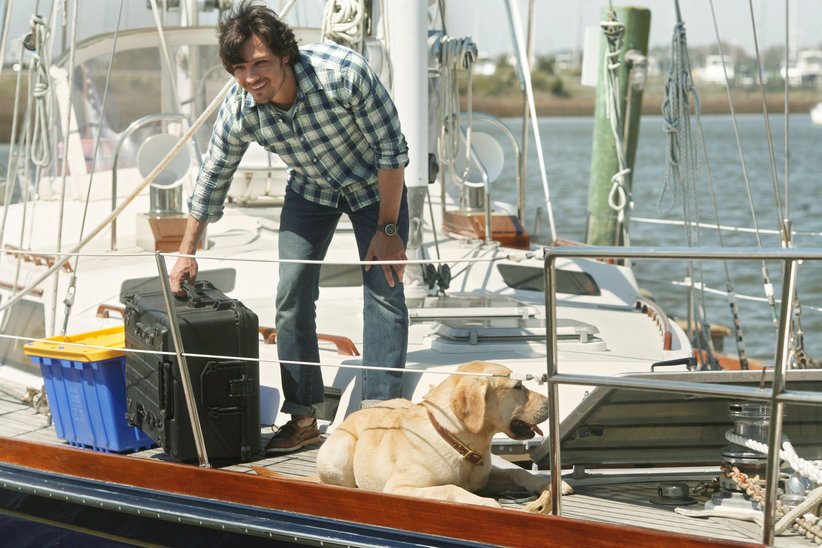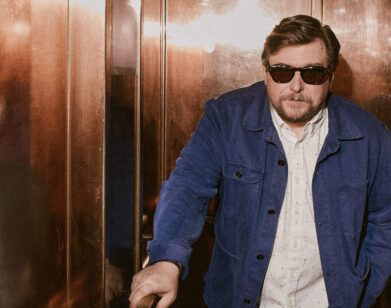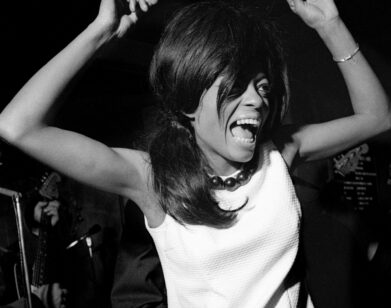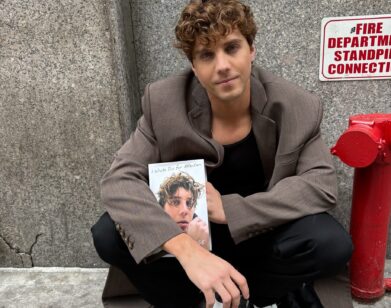Nick Wechsler’s Revenge Fantasy

ABOVE: NICK WECHSLER IN REVENGE. PHOTO COURTESY OF ABC.
On Revenge, Nick Wechsler plays the long-suffering boy next-door, lovelorn and forlorn. Among Revenge‘s stable of all bitchy, plotting characters, Wechsler’s Jack is the moral compass. A father, dog-owner, and kindly older brother, he’s the decent, steady character, often used as the indignantly mistreated pawn in everyone else’s scheming.
Though Revenge is going well and he enthusiastically praises his colleagues, Wechsler sounds exasperated. He muses that writing is a more appropriate path to his mindset, though he hasn’t tried it out yet.
MAGGIE LANGE: Hi Nick, how’s filming going?
NICK WECHSLER: It’s going great. We’re having a good time…
LANGE: Tell me a little more about what this show has made you feel about revenge generally. A little revenge fantasy is common, but this show exaggerates it so much that it seems dangerous to get started thinking on that path. Do you ever have a revenge fantasy wielded towards someone that’s wronged you?
WECHSLER: Well, all the time. Yes.
LANGE: What was the last one you had? Was it a little thing or was it a big thing?
WECHSLER: I used to have a harder time getting a handle on my anger, like traffic would set me off or some shit like that. Not being able to find the thing that I could always find like, “It’s supposed to be right here, what the hell?” Just stupid. When people used to upset me or people being dicks at concerts, I used to take matters into my own hands there and make them be quiet, and that stuff is awful. I just don’t do it anymore. I’m not an asshole in traffic; I stay calm when I can’t find something. None of that shit bothers me. One area where I still need to control me is in dodgeball. I’ve played dodgeball since I was seven and if someone gets me, it’s a stupid competitive thing, I’m like, “Okay, I’m going to come after you.” But usually when someone wronged me personally or started something kind of fucked up, I just have no problem verbally ruining them in front of people.
LANGE: Did that come with age or a change in mindset?
WECHSLER: I think it came from age, but sometimes, too, family members can get under your skin faster than anyone. Even if they’re not purposefully pushing buttons, you assume the worst of their intentions—we take them for granted, we react in a way that if we treated a stranger that way they will be like, “Well, I’ll never talk to you again. Fuck you.” It gets to a dark place sometimes with family. I have a lot of brothers, there’s a lot of testosterone and we would pick on each other and we love each other dearly. But there was also a lot of fighting and stuff growing up, and it wasn’t until I got out of that environment that I started to develop a healthier sense of self and communication. I had friends who would call me on it and I still have friends who will call me on it. For most people, they tell me that I’m being a dick and I try to never be a dick, but that’s how I’m going to be sometimes. I will always apologize if I know I’ve wronged you. It helps having friends that will point me in the right direction.
LANGE: Was it one friend that changed your ways or a series of people?
WECHSLER: It was a bunch of people. [When] you yelled at someone and they either cried or they responded very coldly, and not condescendingly, or they had just a, “What the hell, man? I was just trying to help you” kind of response and you are like, “Oh god, I’m a dick.” Anything like that can shape help you. It’s a burning that we all go through. Age, and trial and error. You just learn what people do and do not deserve from you.
LANGE: So coming back to your family, I did read that you had a very large family. It seems like you guys have your fair share of not getting along.
WECHSLER: We’ve gotten to a place where we can be a lot more openly supportive with each other. There’s still some moments of in-fighting, and that’s probably because of competitive mind game shit. The weird thing about family, is this dynamic that was established many years ago it still exists. It’s still prevalent in our adult years. Even if you’re physically stronger than your older brothers, you still feel smaller opposite them. Whatever dynamic that was established when you were young it still exists, regardless how you interpret what they say and do to you.
LANGE: Yes, that makes so much sense. Is anyone else in your family in the arts or acting?
WECHSLER: Nope. One of my brothers, my youngest brother was interested in it. He has a lot of energy and charm, and I thought it was going to be cool, but there was a part of me that was like [whispers] “Don’t do it.” This business, I wouldn’t wish it on anyone.
LANGE: Why is that?
WECHSLER: It doesn’t care about you. It cares about you when everyone else cares about you. What you have to do to make everyone else care about you, you have no control over that. You can hire a publicist to string up interviews like this, and generate interest in you—stuff like that. Publicists are the main reason we’ve heard of most of the people we’ve heard of in the past 50 years. They are the leaders. We pass magazine stands and we see faces on the covers and we go, “I guess that person has it made,” or, “That person must be a big deal now.” There are many people that say, “I kind of just want to be able to make a living doing this thing, can I?” Well, if you can handle being chewed up and spit out over and over and told that you’re not good enough, if you can stick around for 15 years, then maybe. If you don’t place all of your self-worth in whatever act you get, then okay. If you have a back-up; you have something else going on that means a lot to you and a strong source of income, then okay. If you throw all your eggs in this basket, it will eat you and shit you out. It will give you a crown and a scepter and it will let you sit on the throne and you’ll be like you’re like, “This is amazing!” and then it will kick you out of the kingdom and you’ll be banging on the door trying to get back in. It doesn’t care, and I don’t want that to happen to anyone I love.
LANGE: It sounds like you’re maybe ready to move on from acting. Do you think that’s true?
WECHSLER: [laughs] I don’t think I’m that good at it. I am the worst interview. It’s because I can’t shut the fuck up and say what’s actually on my mind, and apparently that’s not what you are supposed to do.
LANGE: I think that you’re doing fine.
WECHSLER: I still want to act. I want to be doing more. I’d love to be doing comedies and fucking films and shit. I would love to be doing all that. I just want to get to a place where I get more control. I think I can get more creative satisfaction from writing. I get more satisfaction from sending a funny text then I do from most of my performances; because [in] my performances, I’m saying someone else’s words and my opinion of myself is dependant on your opinion of my performances. The way I would deliver something that I wrote, I would allow myself to improvise. That sounds like fun to me. I’m so grateful for my job—I love it. [It’s] brilliant, fun, and everyone is awesome—everything is great. It’s just there’s something about the nature of, “Oh, you have to say it like this—you’ve got to say this exactly,” and it’s hard sometimes when that wouldn’t be how I would do it.
LANGE: What do you like writing the most? Do you do short stories or essays?
WECHSLER: I’ve never written in my life. [laughs] I write funny texts and shit to friends, I don’t, like, write. I don’t want to quit acting, I just want to also do that because I think that I almost get enjoyment out of the process of trying to figure out what the most interesting ways a scene to play out would be then I do from actually acting it out.
LANGE: Do you see something in the script and you’re like “You know what, this decision would be cooler”?
WECHSLER: A writer does great work by doing what they can. They don’t have complete control of the show, honestly, so sometimes it’s that. I like the process of talking with another actor about it. This is why I don’t like performing it as-is—I like doing the math of it. But if I have to get in there and play it out, I’m like, I’m not good at this.
LANGE: Do you think if you were to try your hand at writing, do you think you would want to write screenplays?
WECHSLER: Yeah. I think so.
LANGE: Do have any ideas of a story, or incident or character?
WECHSLER: No, not off the top of my head. They just pop into my head sometimes, or I’ll think of the episode of something. I have an idea, that I could tell you, if I knew how to write and it would test the motivation. It’s really the enemy of all arts I guess.
LANGE: I have one last Revenge question; it’s pretty silly, but I think you might have fun answering it. One of my favorite things about Revenge is the names of the episodes, they’re just these really dramatic words—”Collusion,” “Charade,” “Intrigue”—and I was wondering if you either found that amusing or if there were a particular word that you would like to have be the theme of the episode.
WECHSLER: I’ve always found it interesting that they were able find a new word every time when there’s not much. You could call every episode “Lies” if you wanted to. They come up with all these different ways of saying very similar things or approaching this same idea. I haven’t thought of anything I’d want regarding a title. [laughs]… I haven’t thought that fast. “Confusion.”
LANGE: I think that’s funny; a joke like “Confusion” would be really funny.
WECHSLER: “Convolution…” Is that a word?
SEASON THREE OF REVENGE AIRS SUNDAYS ON ABC.






